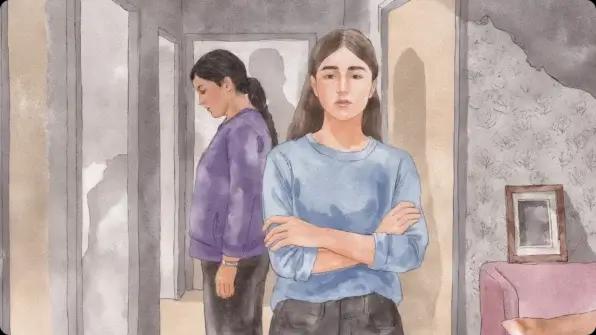“Daddy issues” has become a popular buzzphrase in modern culture. But behind the words lies a complex emotional experience. Many people are affected on a deeper level.
Allow me to introduce myself. I’m Rychel Johnson, a mental health therapist who focuses on anxiety and relationship issues. Many of my therapy clients have described issues with their fathers. Some are upfront and tell me they have “daddy issues.” Let’s unpack what this means.
Quick answers
- At its core, “daddy issues” refer to unresolved emotional conflicts. These issues can leave a lasting imprint.
- While the concept may sound simple, the reality is more intricate. The influence of a father figure on a child’s emotional development is profound. The effects can ripple through adulthood.
- They influence how we form relationships and impact our self-esteem and emotional well-being.
10 Signs of Daddy Issues
So, how do you know if you have daddy issues? Maybe you’re feeling already self-conscious as you read this article. You might feel like you’ve noticed signs of daddy issues.
Here are ten signs and symptoms commonly associated with daddy issues in women. You may relate to some or all of the types of daddy issues:
1. Attraction to Older Men
Women with daddy issues may be drawn to older men. They seek validation or security from a father figure they may have lacked. They desire a sense of protection—the older man may provide that feeling better.
When a woman seeks older men to date, it often reflects an unconscious attempt to fill an emotional void. Daddy issues in women might be expressed through attachment to dominant men as well.
2. Constant Need for Reassurance
Constant reassurance from partners may be necessary for women who have daddy issues. They have a fear of abandonment and lack of trust that impacts their behaviors.
Women may habitually ask if they are loved or seek affirmation that their partner won’t leave them. They may develop feelings of low self-worth if they don’t receive reassurance.
Over time, low self-worth can evolve into seeking attention and reassurance from unhealthy sources.
Unhealthy father-daughter relationships create quite a ripple effect. Needing constant reassurance could mean you’ve experienced childhood trauma. Need to check this out? Take a childhood trauma Breeze test today.
3. You Have a Fear of Abandonment
A woman might develop a deep-seated fear of abandonment or rejection. This fear could lead to clingy behavior and excessive dependence on partners. She may also choose relationships where she feels constantly reassured.
Fear of abandonment can trickle into other areas of life, too. Friendships and other connections can feel temporary. Someone with a fear of abandonment may avoid connecting with others for fear of losing them.
Based on fearing being abandoned, you may think, “I hate my dad.” Maybe he left your family or wasn’t present. The feeling makes sense. It’s not your fault that your father caused issues that affect you today. You can only move forward.
4. You’re Seeking Constant Validation
Women with daddy issues may seek constant approval or validation from men. This approval-seeking behavior is different for everyone. Common signs are:
- Seeking excessive attention
- Seeking affection in an unhealthy manner
- Fishing for compliments
- Wearing clothing that seeks attention from men, specifically
These behaviors can stem from a lack of affirmation in childhood. Insecurity may cause an increase in these behaviors as well.
Daughters of narcissistic fathers may especially seek out validation. Being a narcissist’s child causes trust issues, approval-seeking, and perfectionist tendencies.
5. Trust Issues
An absent or unreliable father figure can cause deep trust issues. Trusting men in relationships may feel impossible for women with daddy issues. They may have trouble believing their partners’ intentions or constantly fear betrayal.
Trust issues are related to fear of abandonment. The father wound is a significant cause of trust issues. This wound involves a lack of guidance and protection—no wonder it’s hard to trust.
Dismantling a father’s wound takes work. If a father wound impacts your ability to trust others, you aren’t alone. Seeking a therapist to help you process this wound can help with healing. You deserve support.
6. Insecurity or Low Self-Esteem
Many women with daddy issues struggle with self-worth. They likely experienced feelings of neglect or emotional absence during their upbringing. This insecurity may manifest in self-doubt, jealousy, or a negative self-image.
People who are “people pleasers” may struggle with low self-esteem. People-pleasing behaviors or fawn trauma response aren’t always linked with daddy issues, but they can be a common indicator. Similarly, overly apologizing can be a sign of insecurity.
Do you suffer from a lack of a father figure? Insecurity can develop from not having a father around. Not having a father can lead to a lack of self-worth—some children blame themselves for their father’s absence.
7. Jealousy and Possessiveness
Women with daddy issues may exhibit signs of jealousy or possessiveness. They might feel threatened by others. They may also appear overly controlling. While they act this way to avoid losing their partner, the control can drive others away.
Feeling insecure or threatened in relationships is hard. Could you benefit from testing your emotional intelligence? Try a Breeze test today to determine your emotional strengths and weaknesses.
8. Difficulty Setting Boundaries
Women with father issues may struggle to set healthy boundaries in relationships. They may either become too emotionally dependent on their partner or tolerate unhealthy behavior to avoid conflict or abandonment.
Problems setting boundaries can often be understood through attachment theory. Early interactions with caregivers shape a person’s attachment style. They could have secure, anxious, avoidant, or disorganized attachments. Disruptions in these early relationships can cause long-term difficulties.
9. Choosing Emotionally Unavailable Partners
A common pattern is selecting partners who are similar to their fathers. The resulting partner is emotionally distant or unavailable. This may be a subconscious repetition of their childhood relationship.
It may feel terrible, but it’s a normal part of experiencing a disconnect from a father figure.
If you’ve been hoping to “fix” what was broken in the past, you aren’t alone. Realizing this is a pattern can be a painful process.
Seeking therapy or a trusted support person can help. You may be able to untangle some unconscious tendencies when selecting potential partners.
If you have experienced childhood emotional neglect, talking about it in therapy is valuable. It’s possible to heal and move forward to form healthy bonds with other people.
10. Difficulty Regulating Emotions
Do you wonder, “Why am I always angry and irritated for no reason?” Your emotional regulation problems may stem from daddy issues.
The ability to regulate strong emotions comes from healthy modeling from parents. If your father wasn’t present, you may resent him. If he demonstrated unhealthy coping methods, maybe you learned from his behaviors.

What Are Daddy Issues?
So, “daddy issues” is a colloquial term often used to describe a problematic relationship with a father figure. This term is often used in a judgmental manner. The concept refers to a range of emotional or behavioral patterns that can occur.
There is no specific definition of daddy issues. Each person has a different interpretation of the term. Daddy issues can manifest in different ways.
- Seeking validation from older men.
- Having extreme difficulty trusting male figures. Having challenges forming healthy relationships.
- Feelings of insecurity or inadequacy may arise.
One of my therapy clients recently disclosed, “I’m afraid of trying to date men. I tend to seek people who remind me of my father, but I don’t know why.” I validated her concern. We were able to take a deep dive into her complex issues with her father.
Symptoms of daddy issues in females are often trivialized or sexualized. This is particularly true about women’s romantic behaviors. It’s as if unresolved fatherly attachment entirely shapes their relationship patterns–but this isn’t true.
Men also have daddy issues. Daddy issues in men often present differently. Also, men with daddy issues may struggle with authority and engage in hyper-masculine behavior. They may have difficulties forming meaningful bonds with other men.
How ‘Daddy Issues’ Evolved From the ‘Father Complex’
In sum, “daddy issues” is a more informal, culturally adapted version of the father complex.
The term “daddy issues” evolved from the “father complex” concept in psychoanalytic theory. This theory, developed by Sigmund Freud and Carl Jung, is still discussed today.
Freud introduced the concept of the Oedipus complex. He claimed that children experience unconscious sexual desires for the opposite-sex parent. Feelings of rivalry toward the same-sex parent could also occur. While outdated, Freud’s teachings remain with us today and inform the term “daddy issues” somewhat.
Carl Jung expanded on this by developing the concept of the father complex. He refers to unconscious associations related to the father figure. The complex could manifest as positive or negative feelings toward one’s father. These relationships can influence how someone approaches relationships.
Over time, the father complex became popular in cultural conversations, and “daddy issues” emerged as a slang term.
“Father complex” in psychoanalysis had specific clinical meanings. However, “daddy issues” is often used to stereotype people who may have attachment or trust issues. This label doesn’t acknowledge the full emotional or psychological background.
What are Mommy Issues?
You’ve heard about daddy issues–but what about mommy issues? Is this also a common theme?
“Mommy issues” are often less discussed in mainstream culture. However, they are equally impactful and affect all genders.
For men, mommy issues may lead to problematic relationships with female partners. A man may harbor unresolved feelings toward women in general.
The term is usually associated with men who are seen as emotionally dependent. You may have seen the label “mama’s boy.” Unfortunately, this idea only reinforces outdated ideas of masculinity and emotional suppression.
For women, mommy issues could result in strained or competitive relationships with other women. Some women with a mother wound may struggle with self-worth and nurturing abilities.
Mommy Issues vs. Daddy Issues
“Mommy issues” and “daddy issues” are thrown around casually. However, these terms stem from complex emotional experiences.
In both cases, these “issues” refer to unmet emotional needs or problematic relationship patterns. While the terms are commonly used, they often oversimplify deep, complex emotional struggles. These struggles may require therapeutic intervention to address fully.
The following table outlines some key differences between the terms:
| Daddy Issues | Mommy Issues |
| Associated with an absent, neglectful, or emotionally unavailable father figure | Stem from complicated or dysfunctional relationships with one’s mother |
| Seeking validation from older men or father-like figures | Difficulties with emotional intimacy or independence |
| Difficulty trusting male partners | Over-attachment to maternal figures (creates dependency) |
| Insecurity or low self-worth, particularly in romantic relationships | Resentment or rebellion against women or mother-like figures |
| Fear of abandonment or excessive attachment to partners | Difficulty forming secure relationships with women or viewing women in overly idealized or negative ways |
What Causes Daddy Issues?
While “daddy issues” is often a blanket term, the root causes are nuanced. Addressing them through therapy or self-awareness can help individuals overcome these patterns. It’s possible to develop healthier relationships.
These issues often stem from unresolved emotional conflicts during childhood. Unmet needs and emotional neglect highlight many cases of daddy issues.
Here are some common causes of daddy issues:
- Absent father – Father not present due to physical abandonment, divorce, death, or emotional distance.
- Emotionally unavailable father – Unmet emotional needs can lead to daddy issues in some cases.
- Inconsistent presence or attention—Not knowing when your father is present can be confusing and can cause someone to seek attention excessively elsewhere.
- An overly critical or demanding father – A demanding father can cause feelings that you’re “not enough.”
- An abusive or toxic relationship with the father – Toxic relationships are tough to sort out and determine how to engage in future relationships healthily.
- Idealization of father – Placing a father on a pedestal regardless of his actions can confuse.
- Lack of affirmation, validation, or praise – Not hearing positive affirmations from a father is potentially damaging.
- Divorce and custody issues – Many custody cases result in less time spent with the father, causing strained relationships.
- Unhealthy dynamics – You may have observed unhealthy interactions between your parents or your father and other women.
- Early loss of a father – Maybe your father died or abandoned your family when you were a young child.
Based on what you’ve read, do you feel you can relate to having daddy issues? Take a daddy issues test today to find out.
How to Fix Daddy Issues
Addressing and healing from “daddy issues” primarily involves self-awareness. You’ve learned what causes daddy issues; now you can work toward healing.
The first step is acknowledging and recognizing the patterns in your relationships. Notice the emotional responses that may stem from unresolved father issues. Additionally, reflect on how your relationship with your father has shaped your behavior and beliefs.
Healing involves working through unresolved feelings. You could talk openly with a trusted friend. You may also want to seek therapy to explore and address these deep-seated issues.
Another essential step in healing is building self-awareness to break unhealthy relationship patterns. Forgiving your father or yourself can also be crucial, depending on the situation. Forgiveness helps release emotional baggage.
Ultimately, fostering self-love, establishing healthy boundaries, and focusing on personal growth are critical steps toward overcoming the effects of “daddy issues.”
Practice self-love and self-acceptance. Learn and practice setting healthy boundaries.
Addressing and working through daddy issues is a process. Gather all your patience and self-compassion–you’ll need it. Allow yourself time to heal and grow. Each step toward healthier relationships is significant–you can do this.
Disclaimer
This article is for general informative and self-discovery purposes only. It should not replace expert guidance from professionals.
Any action you take in response to the information in this article, whether directly or indirectly, is solely your responsibility and is done at your own risk. Breeze content team and its mental health experts disclaim any liability, loss, or risk, personal, professional, or otherwise, which may result from the use and/or application of any content.
Always consult your doctor or other certified health practitioner with any medical questions or concerns
Breeze articles exclusively cite trusted sources, such as academic research institutions and medical associations, including research and studies from PubMed, ResearchGate, or similar databases. Examine our subject-matter editors and editorial process to see how we verify facts and maintain the accuracy, reliability, and trustworthiness of our material.
Was this article helpful?






